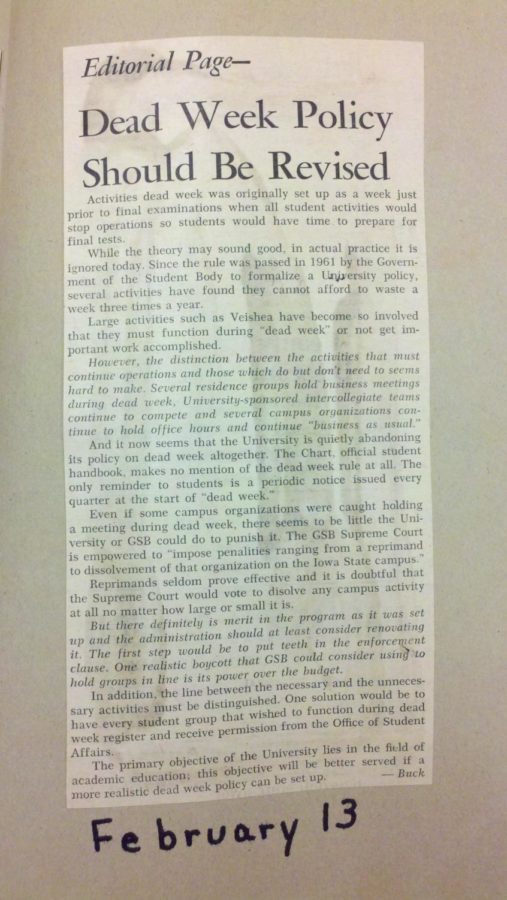Editorial: Stop making a mountain out of Dead Week molehill
Photo: Barry Snell/Iowa State Daily
This photo shows a February 13, 1963, editorial in the Iowa State Daily regarding Dead Week. GSB has been dealing, obviously very unsuccessfully, with Dead Week since 1961— 51 years total now.
November 29, 2012
Dead Week is almost always a controversial topic among students at the end of a semester. We often publish columns, editorials and news articles outlining Dead Week policies. The Government of the Student Body also makes Dead Week an issue, especially in the recent past.
Jared Knight and Katie Brown, now president and vice president, respectively, of GSB, have made it a campaign priority “to strengthen the Dead Week policy,” according to a Daily article on Feb. 13. When Knight ran as the vice presidential choice of Dakota Hoben (the president of GSB in 2011-2012), Dead Week was also a campaign issue. That year, “part of their classroom emphasis [was] implementing a Dead Week policy,” according to a Daily article on March 1, 2011. Back in 2009, Jonathan Turk, who won his race for president of GSB, Dead Week was at least in his sights, if not a priority.
If you go back through the Daily’s website, articles, editorials and letters mention, clarify and criticize Dead Week going back to 1995. You get the idea.
Now, for the unfamiliar, Dead Week is the week before finals week, in which professors “are supposed” to assign less homework and allow more time before cumulative final exams test students’ mettle, retention and sheer sanity. Except the problem is the rules of Dead Week are guidelines, not policies, and the designation “Dead Week” comes from GSB, not the university.
By continually raising the issue but not bringing an actual resolution by adding it to university policy and monitoring whether professors uphold it, students’ time is being wasted.
Our position toward Dead Week is one of ambivalence. In our view, college is supposed to be hard. We say: Bring it on. Scaling the heights of five term papers and finals all in one or two weeks is a thrill few students experience outside a roller coaster ride. And who wants to do that in December anyway? There is something to be said for giving a long train of assignments and examinations a great intellectual heave, and succeeding in moving the mountain. We believe it is a good thing for students to push themselves. How else will they find their limits?
At some colleges and universities, the concept of a “dead week” actually exists in reality, not as the mental figment of a small but self-important minority of student government members, especially candidates for and holders of executive branch positions, who presume to take it upon themselves to tell professional university administrators how to do their jobs. Classes actually are canceled so students can study for exams and write term papers, and quiet hours reign in the residence halls throughout the entire day. Good for them.
For Iowa State, however, that is not the case.










